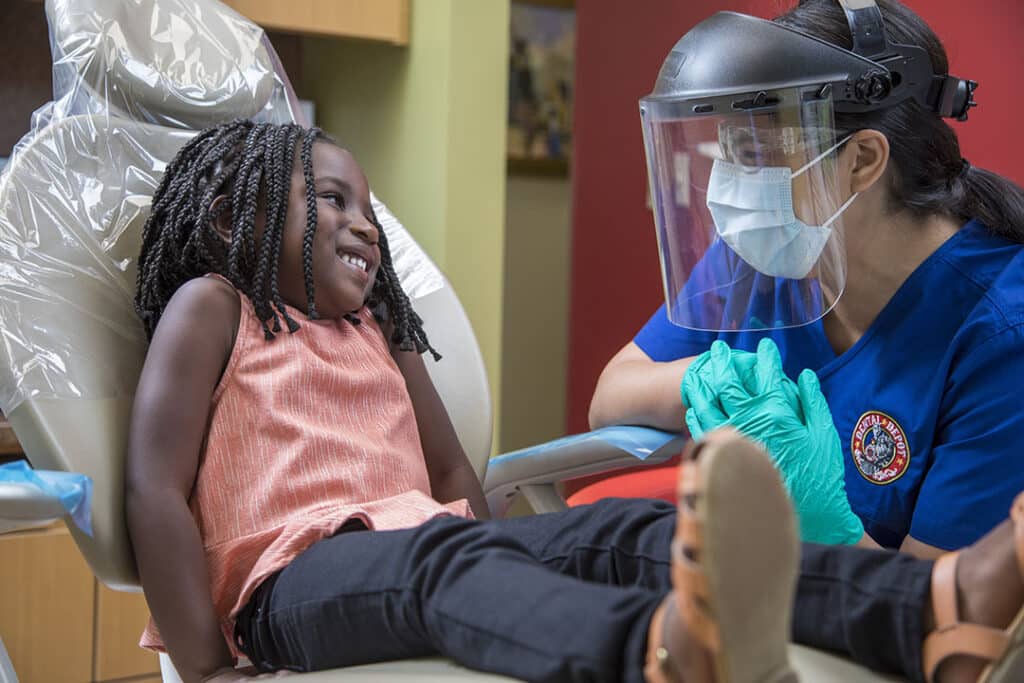Your Baby’s First Teeth: A Big Step in Their Bright Smile Journey
Your baby’s first teeth mark an exciting milestone! Caring for those tiny teeth early and understanding what’s ahead in your child’s oral development can set the stage for a healthy, confident smile that lasts a lifetime.
What Are Baby Teeth?
Also known as primary teeth, deciduous teeth, or milk teeth, baby teeth are present in the jaw at birth, but you’ll see the first tooth emerge around six months of age. From then until about age three, your child will get about four new teeth every six months, starting in the middle of the top and bottom rows and ending with the molars in the back.
Baby teeth begin to fall out around age six or seven, making way for permanent adult teeth. They usually follow the same pattern as they came in—front to back. This process varies by child, but rest assured, it’s all part of their natural development!
Why Are Baby Teeth So Important?
Baby teeth play a crucial role in your child’s ability to speak, chew, and smile. They also help the facial muscles develop properly and save space for the adult teeth growing under the gums. Losing baby teeth too early, due to decay or injury, can disrupt this process, leading to crowding, crooked teeth, or delays in adult teeth coming in.
How to Care for Baby Teeth
Baby teeth deserve the same care and attention as adult teeth. Cavities in baby teeth can cause pain, infection, and even damage the adult teeth growing below. Start brushing as soon as the first tooth appears with a smear of fluoride toothpaste (about the size of a grain of rice) and a soft-bristle toothbrush.
Schedule your child’s first dental visit by their first birthday. This early visit introduces them to the dentist, helps them get comfortable in the office, and gives you expert advice on maintaining their oral health.
Tips for Protecting Baby Teeth
Keep your baby’s teeth clean and cavity-free with these simple steps:
- Avoid putting your baby to bed with a bottle.
- Limit the use of bottles and sippy cups.
- Offer water in bottles or cups when needed.
- Cut back on juice and sticky snacks, offering them only during meals or not at all.
Fluoride treatments and dental sealants provide added protection. Fluoride strengthens tooth enamel, while sealants guard against cavities in hard-to-reach areas like molars. Both are easy, effective, and help prevent more costly dental work down the road.
What Happens When Baby Teeth Fall Out?
When those tiny teeth start to wiggle and fall out, it’s up to you what to do with them! Many parents save them as keepsakes or discard them, but did you know baby teeth can also be preserved for stem cells?
The most important thing is teaching your child to care for their new adult teeth. These are the only set they’ll get, so helping them understand the importance of brushing, flossing, and regular dental visits is key.
Pediatric Dental Care at Dental Depot
At Dental Depot, we’re here for your family every step of the way—from your baby’s first tooth to their first set of braces and beyond. We recommend bringing your child in by their first birthday to meet the dentist and start their oral health journey on the right track.
With flexible scheduling, Saturday appointments, and the option to book for the whole family, Dental Depot makes caring for your child’s smile easy and stress-free. Whether you’re in Oklahoma City, Tulsa, or anywhere nearby, there’s a Dental Depot location ready to serve you.
Find your nearest Dental Depot office to schedule an appointment today. Let’s build healthy smiles together!

